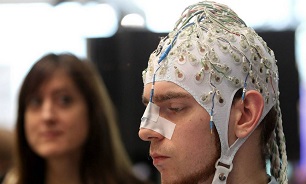Ford Analyzed Pro Racers' Brains To Understand Concentration
In early November, Ford Performance announced its intent to collaborate with King's College London and tech firm Unit9 to perform brain scans using a head-mounted electroencephalogram.

KhodroCar - The EEG headset, a miniaturization of cumbersome, lab-bound equipment, was paired with a virtual reality headset and driving simulator to examine both reaction time and concentration of participants. This equipment was used to gauge electrical activity within the brains of the study's participants which included members of the general population and professional racing drivers such as five-time consecutive World Rally Championship winner Sébastien Ogier and triple World Touring Car Championship winner Andy Priaulx.
Ford published partial results of the test on Thursday, describing the procedure used in the study and the results. The professionals and unprepared members of the public were used as control groups and their results were used for comparison with members of the public that were given preparation exercises prior to testing. These exercises consisted of breathing techniques and keyword-based visualization exercises. Details on these preparation methods, however, were not disclosed.
So, how did each group perform?
"The study data revealed that when travelling at high speed and in a state of high focus, racing drivers’ brains performed up to 40 percent better when it comes to ignoring distractions than yours or mine,” stated neuroscience researcher Dr. Elias Mouchlianitis, of King’s College London, in Ford's release on the study. "The interesting thing we found, however, was that when normal people performed some simple mental exercises, they were also able to reach this higher level of performance."
Ford states that members of the public given instructions on the aforementioned preparation techniques saw improvements in their concentration by as high as 50 percent, exceeding that of the professionals they were pitted against.
"When things get tough and the pressure’s on that’s when you need to get in this zone, and the good guys, the successful racing drivers, are able to do that whether that’s on the track or off it. Racing drivers aren’t necessarily born with this skill; our experiment showed that simple mental training ahead of a task can help anyone to improve focus and ignore distractions, making them more successful at the task in hand.”
According to Ford's release, a racing helmet with an integrated EEG is under development, allowing for telemetry on the driver, in addition to that of the car, to be transmitted to the pit wall. Ford believes that examining and tracking a driver's brain activity mid-race is "the next frontier in performance." Given Ford's recent reinvestment in endurance racing, the most grueling form of motorsport, knowing when to give drivers a rest to stay at peak performance could make the difference between victory and defeat in Ford's racing future.
Ford published partial results of the test on Thursday, describing the procedure used in the study and the results. The professionals and unprepared members of the public were used as control groups and their results were used for comparison with members of the public that were given preparation exercises prior to testing. These exercises consisted of breathing techniques and keyword-based visualization exercises. Details on these preparation methods, however, were not disclosed.
So, how did each group perform?
"The study data revealed that when travelling at high speed and in a state of high focus, racing drivers’ brains performed up to 40 percent better when it comes to ignoring distractions than yours or mine,” stated neuroscience researcher Dr. Elias Mouchlianitis, of King’s College London, in Ford's release on the study. "The interesting thing we found, however, was that when normal people performed some simple mental exercises, they were also able to reach this higher level of performance."
Ford states that members of the public given instructions on the aforementioned preparation techniques saw improvements in their concentration by as high as 50 percent, exceeding that of the professionals they were pitted against.
"When things get tough and the pressure’s on that’s when you need to get in this zone, and the good guys, the successful racing drivers, are able to do that whether that’s on the track or off it. Racing drivers aren’t necessarily born with this skill; our experiment showed that simple mental training ahead of a task can help anyone to improve focus and ignore distractions, making them more successful at the task in hand.”
According to Ford's release, a racing helmet with an integrated EEG is under development, allowing for telemetry on the driver, in addition to that of the car, to be transmitted to the pit wall. Ford believes that examining and tracking a driver's brain activity mid-race is "the next frontier in performance." Given Ford's recent reinvestment in endurance racing, the most grueling form of motorsport, knowing when to give drivers a rest to stay at peak performance could make the difference between victory and defeat in Ford's racing future.
Source: thedrive.com
Latest News


